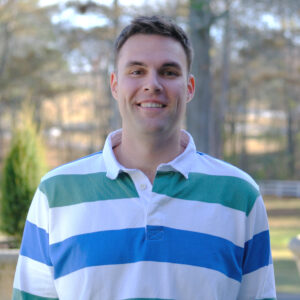In this new Vital Signs series, we feature graduate student Andrew Scott Kennedy Jr., in the Thaxton lab. He’s a budding microscopist who plans to dedicate his research career to understanding health and disease to help patients.

Andrew Scott Kennedy Jr. is a 4th year PhD Candidate in the lab of Jessica Thaxton, PhD, associate professor of cell biology and physiology and member of UNC Lineberger Comprehensive Cancer Center. In the lab, Kennedy Jr. uses super-resolution microscopy techniques to visualize and better understand how CAR-T cells, a specialized type of immunotherapy, battle solid cancers like sarcoma to help patients overcome the disease.
Q: What were your interests when young, and how did you get into biomedical science?
A: When I was in elementary school, I looked forward to the yearly science fair experiments. At first, I wanted to play around with baking soda and vinegar “volcanos”, but science quickly became my favorite subject. Clinical science was the only field I knew about because both my father and grandmother worked in healthcare.
When I attended UNC-Chapel Hill as an undergraduate, I volunteered in Robert Tarran’s laboratory at the Marsico Lung Institute/UNC Cystic Fibrosis Center studying lung disease just to get experience for medical school applications. I immediately decided to switch to a career in research because I fell in love with the creative puzzle-solving and seeing how the discoveries researchers made at UNC were advancing our understanding of medicine and biology.
Q: Why did you choose UNC and the lab you are in?
A: I chose UNC because of the amazing accessible technology we have here, and the fact that there is an abundance of world-class experts we can connect and work with. I joined my current group, the Thaxton lab, because they were using cool techniques to study immune cells, and at the same time studying a subject that would influence cancer treatment.
Q: What are you working on right now?
A: I’m studying CAR-T cells, an immunotherapy that uses a patient’s own immune cells to treat their cancer. CAR-T cells have shown amazing results in patients with some blood cancers, but unfortunately, it hasn’t been as successful in solid tumors like sarcomas. I use super-resolution microscopy techniques, in collaboration with other experts at UNC, to study how changes made to these CAR-T cells can improve the treatment of solid cancers. Right now, I am developing a way to get extremely magnified pictures of these cancer-killing cells so we can better understand how they work in patients.
Q: What inspires you the most about working in your field?
A: I love microscopes, so I always get curious to try new imaging techniques when they are published. But when I read the latest research in immunotherapy, the bottom line for this work is if it improves survival of patients. When you’re at the lab bench you can get lost in the specifics and forget what the end goal of your work is, so it’s really exciting to see when new developments are directly helping patients.
Q: What are your goals after earning your PhD?
A: I would love to continue to work on CAR-T cell research. Some groups are expanding this therapy to other diseases, like autoimmune disorders or viral infections. Regardless of whatever subject it happens to be, I want to be close to a microscope in my next work.